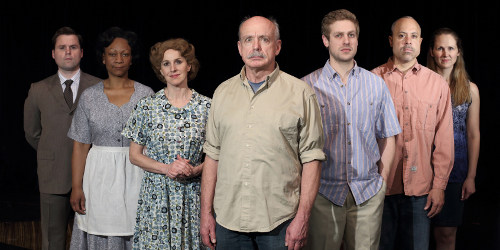By Judith Cookis Rubens

If you're shifting uncomfortably in your seat at Farmers Alley's latest offering, "Clybourne Park," it's probably not the stiff seat cushion to blame.
It's the anxious tension swirling onstage in Bruce Norris' darkly comic look at 50 years of race relations in one Chicago neighborhood.
It's 1959 in a still-segregated Northwest Chicago neighborhood. Themes of race and class loom large. Act Two picks up 50 years later, in the same home's living room, now scheduled for demolition to make way for a bigger, better house. A new cast of characters, for all their political correctness, find themselves confronting the same unspoken tensions, only now things get pushed to the surface.
Under guest director Awoye Timpo's razor-sharp direction, a talented seven-member cast builds the drama skillfully. The thought-provoking interactions make audiences squirm, cringe and do a few double takes – "Did they just say that?" Is it wrong to laugh out loud at that?
For a bit of backstory, playwright Norris' story is a response to the classic play, "A Raisin in the Sun." In Act One, we meet a white couple, Russ and Bev, about to (unknowingly, through their realtor) sell their middle-class home to the neighborhood's first black family – the Youngers, of Lorraine Hansberry's classic play. We never meet the Younger family, but we hear a lot of speculation about them and their motives.
Though surprised at their buyers' identity, Russ and Bev aren't worried like some of their neighbors, particularly Karl (Ben Reigel, in a decidedly un-PC role). Insensitively dragging Russ' and Bev's black maid, Francine, and her husband into the mess, Karl makes the pair answer for an entire race. Spewing a melody of '50s-era biases, Karl painfully tries to prove that a black family would not enjoy life in Clybourne Park. They wouldn't find "their food" in the local grocery, they don't ski, they don't worship the same, he says, all the while hissing about declining property values and fearing change. The slowly building chaos, at first light and humorous, turns exquisitely painful before intermission.
Russ and Bev, meanwhile, are dealing with the personal trauma of losing their son, a Korean War vet. They are buried under layers of grief, anger and confusion, unable to connect and unable to voice their feelings. What, at first, might seem like an unconnected sub plot becomes a metaphorical link between both eras. Russ' and Bev's unspoken truths about their son have created distance. The philosophical distance between the white couple and the black couple in Act Two could just as easily be blamed on years of burying fears and biases under euphemisms and politically correct language.
Act Two takes place in 2009 and features a different (but oddly familiar) cast of characters. A white couple, Steve and Lindsey, want to move into the (now mostly-black) Clybourne Park neighborhood, which is being gentrified. The couple wants to tear down and re-build in the historic neighborhood, which worries Lena, a relative of the Younger family from Act One. She remembers her family's hard introduction to the neighborhood and takes pride in the life they built. The imminent takeover of homes and arrival of corporations like Whole Foods feels threatening to Lena.
Again, in the second half, there's chaotic dialogue and awkward tension, but this time around, the players seem more sophisticated and worldly, more aware of each other's lifestyles and history. They are definitely more politically correct.
Until they aren't.
Just under the surface, old biases come rushing up – on every side. No gender, race, religion or sexual orientation is safe from ruthless, offensive jokes. Watching the polite context erode is funny at first, then shocking, but always difficult.
The cast, each playing characters from both time periods, gives Norris' tremendously clever play a vibrancy that works.
Reigel, playing two generations of loud-mouthed, insensitive bigots, keeps provoking new hurts. You almost can't believe he's saying these things, but, then again, you probably know a few like him.
Ronald L. Centers is thoroughly compelling as the grieving, raging Russ. Dwandra Nickole Lampkin is spot-on with her dual roles, capturing maid Francine's quiet angst, and, later, fully exploring Lena's pent-up rage at historic injustices. Tory Matsos, playing pregnant women in both acts, seamlessly transitions from a deaf character to a privileged, "how can I be racist?" mom-to-be. Brigette Sitarski, Von Washington, Jr., and Colin Woodside are memorable too, and add humor.
The action happens in W. Douglas Blickle's appropriately cozy living room set, which soon starts to feel dizzyingly claustrophobic. During intermission, patrons are treated to flash video images of major political and social milestones of the '60s-'90s (Rodney King verdict, 9/11, President Obama's election, to name a few), filling in the gaps of the intervening years.
"Clybourne Park" doesn't offer answers for bridging our obvious divides. Wars will still happen. People will still cling to the familiar and fear the unknown. Neighborhoods are the ultimate territories to be defended and preserved. Stereotypes are still in play.
But Norris' provocative script, a 2011 Pulitzer-winner, thrusts these truths into the open, making them harder to hide from. Maybe it's a small part toward progress.
REVIEW:
'Clybourne Park'
Farmers Alley Theatre, 221 Farmers Alley, Kalamazoo. 8 p.m. Thursday-Saturday and 2 p.m. Sunday through Feb. 23. $27-29. 269-343-2727. http://www.farmersalleytheatre.com










